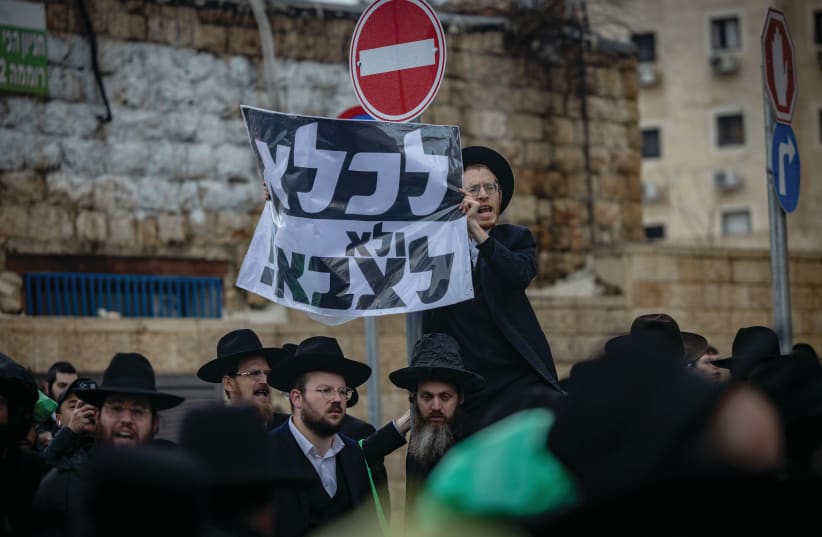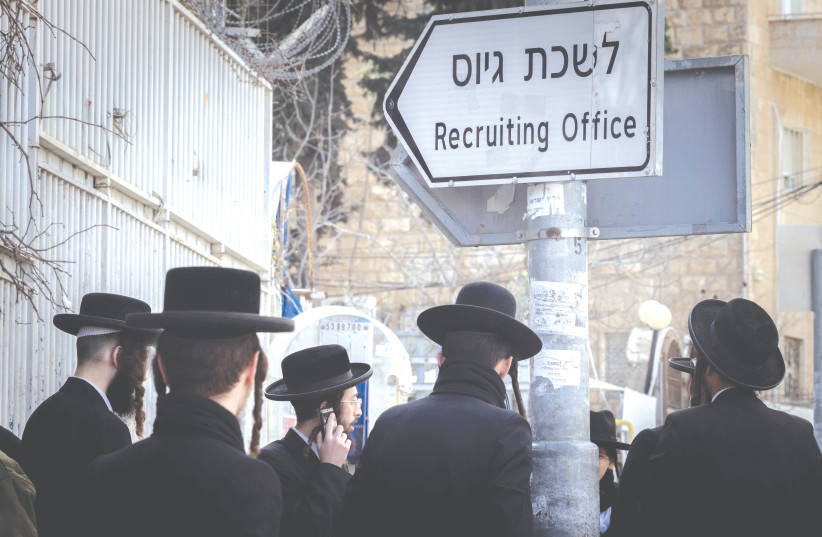A country at a crossroads: The issue of Haredi IDF service post-October 7

מי יימר דדמא דידך סומק טפי דילמא דמא דהוא גברא סומק טפי
סנהדרין עד ע"א
The closest way to a compromise would be some variation on the Benny Gantz proposal of all Haredim having to do national service, with a more symbolic number serving in the IDF.

The country is at a crossroads – and the largest one may not even be the war in Gaza.
As big as the current battles and diplomatic duals over Gaza are, there are going to be a host of parties, factors, and additional critical points where Israel and the region’s future relations will continue to be shaped.
In contrast, the country may have reached the end of the line on the issue of haredim serving either in the IDF, national service, or some mix of the two.
Generally, polls showed that a massive majority of Jewish Israelis favor haredim serving in the IDF, as other sectors of the public do.
Until October 7, however, the Haredim did not want to serve, and the almost impossibility of forming a government without them (they have only been completely out of power for less than five years in the last 30-plus years) meant they got their way on the issue.
 |
באַנק קוועטטשערס |
Part of this was also because the issue of their service was seen as separate from the “real” debates over foreign affairs, which dictated how most people in Israel voted.
October 7 permanently fused together the issues of national security and haredim serving.
To continue the war and be ready for the next war, the IDF needs a permanently larger army.
To do that, either the haredim need to start serving (and dying sometimes, like everyone else in battle), or everyone else needs to serve more (and die more in battle).
There is no longer a way to sweet-talk through this mostly zero-sum game.
Fusing the two issues together
The closest way to a compromise would be some variation on the Benny Gantz proposal of all haredim having to do national service, with a more symbolic number serving in the IDF.
This would not truly address all of the IDF service inequalities that have existed now for 75 years, but it would at least show the majority of the population that the Haredim are ready to contribute to the national destiny in a physical and quantifiable way. (Haredim claims they care for the spiritual sustenance of the nation.)
Also, if more Israelis from other sectors were being pulled out of necessary jobs, the Haredim stepping in with national service would cover some of that gap.
But even that entire gap it would not fill, according to a new study.
The government’s legislation extending military reserve service, as revealed in a study by Israel Hofsheet and the well-known BDO accounting firm, is expected to cost the Israeli economy NIS 5.8 billion annually.
The study’s conclusions are solely based on budgetary cost, ignoring the additional financial burden to the Israeli economy. Beyond the direct impact of increasing the state budget, the study says additional days of reserve duty damage business operations, employment, and the income of reservists’ spouses. According to the study, they also damage academic education and leisure hours for reservists.
Furthermore, the study says its estimate is grounded in the assumption of a partial realization of only 35% of the additional days of reserve duty outlined in the government’s bill, mirroring the existing realization rate.
The study says the economic burden is projected to increase to NIS 8.1 b in the event of an intensified security climate, necessitating an additional 10% realization of reserve duty days.
So, the Israeli economy actually would still suffer in new larger ways that were not contemplated before Israel learned it needed a much larger permanent army. However, the Gantz compromise would temper some of the economic impact and start a social transformation within the haredi community of connecting and contributing more to the nation.
Opposition leader Yair Lapid’s plan would not achieve equality either, but it would substantially increase the Haredim being tied to the nation’s fate because far more would serve in the IDF and also share in the new and increased risks of longer and bloodier wars in the region.
The Movement for the Quality of Government in Israel’s proposal of full and equal haredi integration into the IDF would achieve true equality in theory. But in practice, the IDF does not have the ability to integrate all of the draft-eligible haredim, and it probably would take years to do so, if it is doable at all.
There are too many social and educational issues to work through to induct haredim in anything other than gradual numbers, and above a certain volume, it is not even clear that the IDF wants to spend the number of resources necessary to integrate so many Haredim at once.
The lack of an agreement about how to solve the crisis has continued to give the completely consistent rejectionist haredi position a leg to stand on for the last several months.
But too many have died this time, and too many are expected to have to abandon their families for too long in the near future for the Haredim to be able to completely “dodge the bullet” this time.
As they join the post-October 7 world, they will need to come to terms with some kind of radical change.